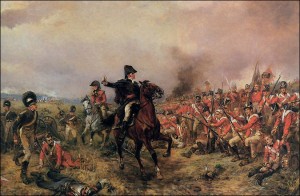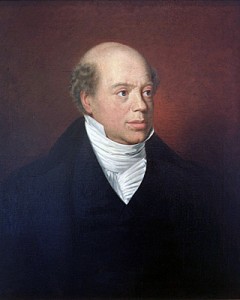All links are to Wikipedia entries.
Government, Politics, and War:
- January 8: Andrew Jackson defeats British troops in the Battle of New Orleans. The Treaty of Ghent had been signed on December 24, 1814, but news of the peace does not reach New Orleans until February.
- February 26: Napoleon escapes from Elba.
- March 15: The Corn Laws introduced import tariffs to support domestic grain prices against competition from less expensive foreign-grain imports, causing a significant increase in the price of grain (called “corn” in England).
- March 20: Napoleon marches into Paris with a regular army of 140,000 and a volunteer force of around 200,000. He takes over the government again for a period known as The Hundred Days.
- March: A new alliance mobilizes to oppose Napoleon’s renewed threat to peace. Austria, Prussia, Russia, and Britain raise a combined force of one million men.
- June 9: Despite Napoleon’s return to power, the Congress of Vienna has proceeded, and finalizes its last act nine days before Waterloo.
- June 18: Final defeat of Napoleon at the Battle of Waterloo. He again abdicates in favor of his son, but the Allies’ entry into Paris puts an end to the Bonaparte regime.
- July 8: Louis XVIII returns to Paris and is restored as King of France.
- October 15: Napoleon begins his final exile on the island of St. Helena.
- November 20: A second Treaty of Paris signed, and is much harsher to France than the 1814 treaty. France is reduced to its 1790 boundaries, losing the territorial gains of the Revolutionary armies in 1790-92, which the previous treaty had allowed France to keep. It also requires France to support a 150,000-man Allied army of occupation.
Society and Social History:
- January 2: Lord Byron marries Anne Isabella Milbanke.
- January: Emma, Lady Hamilton, famous mistress of Lord Nelson, dies in Calais where she had fled to escape her creditors.
- June 19: London banker Nathan Mayer Rothschild receives carrier pigeon reports from Belgium advising him of Napoleon’s defeat at Waterloo. Feigning gloom, he depresses the price of British consols by selling short, then has his agents buy them up at distress prices, and when news of Wellington’s victory sends prices sky-high, Rothschild sells, reaping a great fortune on the London Exchange.
- July – December: Britain suffers economic depression as demand for military supplies abruptly ceases and as Continental markets are unable to absorb backlogged inventories of English manufactured goods. Prices fall, thousands are thrown out of work, and 400,000 demobilized troops add to the problems of unemployment.
Literature, Journalism, and Publishing:
- Lord Byron’s poem “She Walks in Beauty” is published in his collection Hebrew Melodies.
- Percy Bysshe Shelley writes Alastor, or The Spirit of Solitude.
- Walter Scott publishes The Antiquary and Guy Mannering.
- Jacob and Wilhelm Grimm publish their second volume of Folk Tales for Children and the Home, adding 70 new fairy tales to the collection.
Art, Architecture, and Design:
- The rebuilding of Brighton Pavilion by John Nash begins, replacing the neo-classical pavilion with a Mughal-inspired pleasure palace of minarets and onion domes.
- J.M.W. Turner paints Dido Building Carthage, one of his most important works..
- April 22: Portrait painter Thomas Lawrence is knighted by the Prince Regent.
- June 1: British caricaturist James Gillray dies at age 57.
- September: American painter John Singleton Copley dies at age 77.
Science and Industry:
- John McAdam’s new method for surfacing roads (a hard, durable process of crushed stone and gravel, similar to asphalt) is adopted by England. The new process came to be known as “macadamization” and roads were said to be “macadamized.”
- Dental floss is invented by Levi Spear Parmly, a dentist from New Orleans.
- February 3: The first commercial cheese factory is founded in Switzerland.
- July 10: The Apothecaries Act bans unlicensed medical practitioners in Britain.
- November 3: Sir Humphry Davy patents the miner’s safety lamp for use in coal mining.






